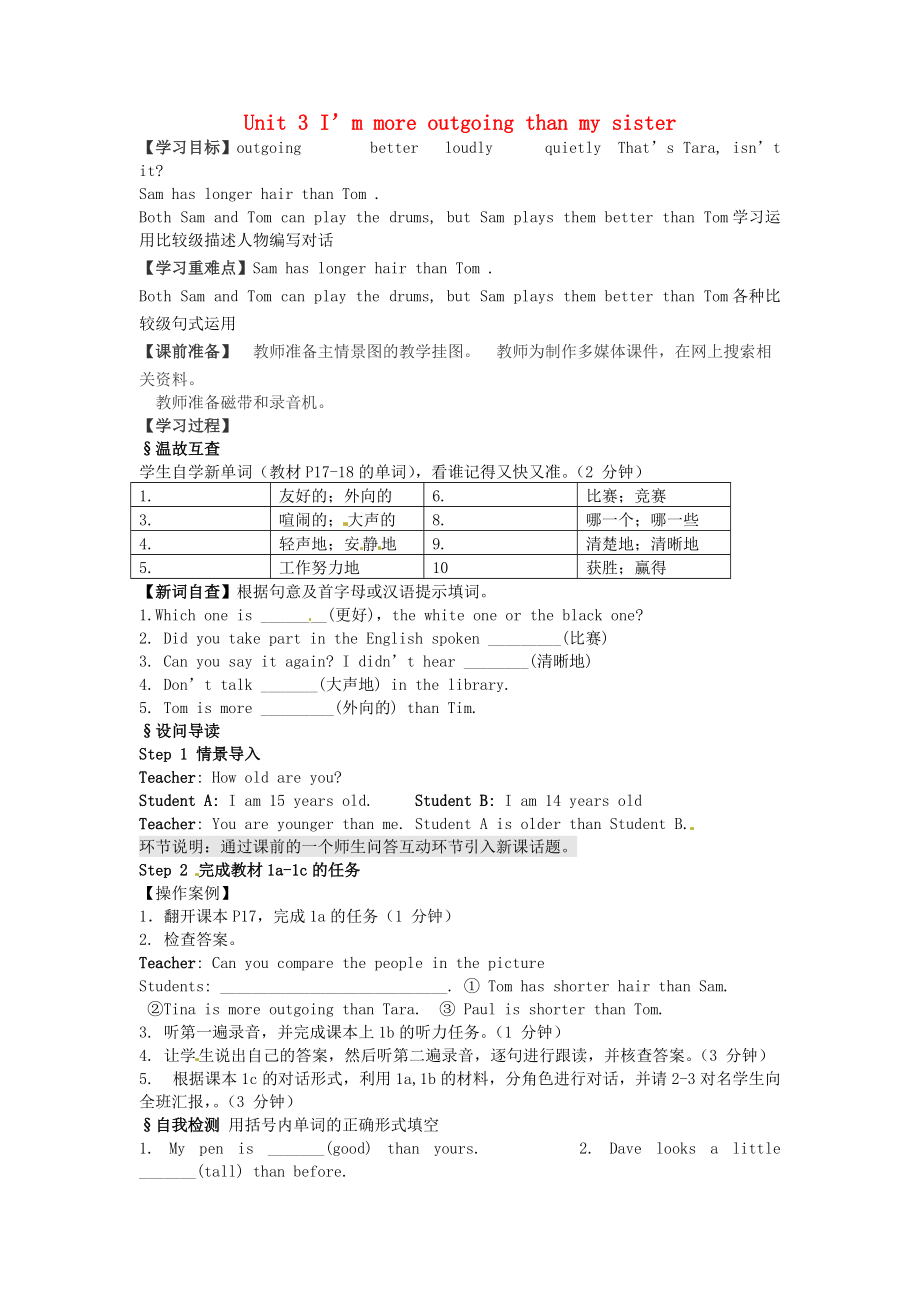《四川省瀘州市龍馬潭區(qū)八年級(jí)英語(yǔ)上冊(cè) Unit 3 I’m more outgo ing than my sister第1課時(shí)Section A1a2d學(xué)案無(wú)答案新版人教新目標(biāo)版》由會(huì)員分享��,可在線閱讀���,更多相關(guān)《四川省瀘州市龍馬潭區(qū)八年級(jí)英語(yǔ)上冊(cè) Unit 3 I’m more outgo ing than my sister第1課時(shí)Section A1a2d學(xué)案無(wú)答案新版人教新目標(biāo)版(2頁(yè)珍藏版)》請(qǐng)?jiān)谘b配圖網(wǎng)上搜索。
1����、
Unit 3 I’m more outgoing than my sister
【學(xué)習(xí)目標(biāo)】outgoing better loudly quietly That’s Tara, isn’t it?
Sam has longer hair than Tom .
Both Sam and Tom can play the drums, but Sam plays them better than Tom學(xué)習(xí)運(yùn)用比較級(jí)描述人物編寫(xiě)對(duì)話
【學(xué)習(xí)重難點(diǎn)】Sam has longer hair than Tom .
Both Sam and Tom can
2、play the drums, but Sam plays them better than Tom各種比較級(jí)句式運(yùn)用
【課前準(zhǔn)備】?教師準(zhǔn)備主情景圖的教學(xué)掛圖����。?教師為制作多媒體課件,在網(wǎng)上搜索相關(guān)資料���。
?教師準(zhǔn)備磁帶和錄音機(jī)��。
【學(xué)習(xí)過(guò)程】
§溫故互查
學(xué)生自學(xué)新單詞(教材P17-18的單詞)�����,看誰(shuí)記得又快又準(zhǔn)�����。(2 分鐘)
1.
友好的��;外向的
6.
比賽��;競(jìng)賽
3.
喧鬧的����;大聲的
8.
哪一個(gè);哪一些
4.
輕聲地�����;安靜地
9.
清楚地��;清晰地
5.
工作努力地
10
獲勝�;贏得
【新詞自查】根據(jù)句意及首字母或漢語(yǔ)提示
3、填詞��。
1.Which one is ________(更好)��,the white one or the black one?
2. Did you take part in the English spoken _________(比賽)
3. Can you say it again? I didn’t hear ________(清晰地)
4. Don’t talk _______(大聲地) in the library.
5. Tom is more _________(外向的) than Tim.
§設(shè)問(wèn)導(dǎo)讀
Step 1 情景導(dǎo)入
Teacher: How
4�、 old are you?
Student A: I am 15 years old. Student B: I am 14 years old
Teacher: You are younger than me. Student A is older than Student B.
環(huán)節(jié)說(shuō)明:通過(guò)課前的一個(gè)師生問(wèn)答互動(dòng)環(huán)節(jié)引入新課話題。
Step 2 完成教材1a-1c的任務(wù)
【操作案例】
1.翻開(kāi)課本P17,完成1a的任務(wù)(1 分鐘)
2. 檢查答案��。
Teacher: Can you compare the people in the picture
Stude
5��、nts: ____________________________. ① Tom has shorter hair than Sam.
②Tina is more outgoing than Tara. ③ Paul is shorter than Tom.
3. 聽(tīng)第一遍錄音��,并完成課本上1b的聽(tīng)力任務(wù)���。(1 分鐘)
4. 讓學(xué)生說(shuō)出自己的答案�����,然后聽(tīng)第二遍錄音,逐句進(jìn)行跟讀��,并核查答案����。(3 分鐘)
5. 根據(jù)課本1c的對(duì)話形式,利用1a,1b的材料��,分角色進(jìn)行對(duì)話�,并請(qǐng)2-3對(duì)名學(xué)生向全班匯報(bào),���。(3 分鐘)
§自我檢測(cè) 用括號(hào)內(nèi)單詞的正確形式填空
1. My
6�、 pen is _______(good) than yours. 2. Dave looks a little _______(tall) than before.
3. This piece of paper feels much _______(thin) than that piece.
4. These pants are ________(new)than those.
5. Lucy seems __________(outgoing) than Lily.
環(huán)節(jié)說(shuō)明:通過(guò)學(xué)習(xí)1a,讓學(xué)生熟悉并掌握新的形容詞����;通過(guò)1b,鍛煉學(xué)生的聽(tīng)力及抓取關(guān)鍵信息的能力
7���、��;通過(guò)1c的訓(xùn)練鍛煉學(xué)生的口頭表達(dá)能力�����,同時(shí)鞏固所學(xué)的語(yǔ)言知識(shí)���。
Step 3 完成教材2a-2c的任務(wù)
【操作案例】
1.翻開(kāi)課本p.18,認(rèn)真聽(tīng)錄音����,完成2a的聽(tīng)力任務(wù)。 (3 分鐘)
2.再聽(tīng)一遍錄音���,完成2b的聽(tīng)力任務(wù)��。(2 分鐘)
3.聽(tīng)力內(nèi)容鞏固訓(xùn)練�����,大聲朗讀聽(tīng)力材料
4. 模仿聽(tīng)力聽(tīng)力內(nèi)容����,然后分角色進(jìn)行對(duì)話練習(xí),然后邀請(qǐng)2-3對(duì)學(xué)生表演����。 (4 分鐘)
環(huán)節(jié)說(shuō)明:通過(guò)對(duì)所學(xué)習(xí)的目標(biāo)語(yǔ)言進(jìn)行聽(tīng)、說(shuō)���、讀����、寫(xiě)訓(xùn)練����,不僅鍛煉了學(xué)生的語(yǔ)言綜合運(yùn)用能力���,還鞏固了學(xué)生對(duì)目標(biāo)語(yǔ)言的學(xué)習(xí)�����、識(shí)記和運(yùn)用�����。
Step 4 完成教材2d的任務(wù)
1. 播放2d錄音��, 學(xué)生跟讀����,
8、 然后模仿錄音并在小組內(nèi)練習(xí). 完成2d任務(wù)�����,
2. 讓學(xué)生兩人模仿錄音并在小組內(nèi)練習(xí)�,在小組內(nèi)編新對(duì)話,進(jìn)行口語(yǔ)訓(xùn)練�,并上臺(tái)表演(4 分鐘)
§鞏固訓(xùn)練
補(bǔ)全對(duì)話:
A: Hello, did you like the singing competition B: 1
A: 2 B: Yes, she did well. But Mary did better than her.
A: 3 B: I think
9、 Mary sang more loudly and clearly.
A: Yes, But Lucy dances better than Mary. She practices every day. And she won the last dancing competition last week. 4
B: That girl in the red dress and with long hair. A: I see. 5 .
B: Yes, she is. And she is my cla
10�����、ssmate.
A. Why do you think so��? B. Did Lucy do well ?
C. Which is Mary? D. Yes, I did. It was fantastic?
E. Is she in Class One?
§拓展研究(詳見(jiàn)學(xué)生訓(xùn)練部分P.15).
§課堂小結(jié)
§作業(yè)
§課后反思
我國(guó)經(jīng)濟(jì)發(fā)展進(jìn)入新常態(tài),需要轉(zhuǎn)變經(jīng)濟(jì)發(fā)展方式�����,改變粗放式增長(zhǎng)模式����,不斷優(yōu)化經(jīng)濟(jì)結(jié)構(gòu),實(shí)現(xiàn)經(jīng)濟(jì)健康可持續(xù)發(fā)展進(jìn)區(qū)域協(xié)調(diào)發(fā)展�����,推進(jìn)新型城鎮(zhèn)化����,推動(dòng)城鄉(xiāng)發(fā)展一體化因:我國(guó)經(jīng)濟(jì)發(fā)展還面臨區(qū)域發(fā)展不平衡、城鎮(zhèn)化水平不高�、城鄉(xiāng)發(fā)展不平衡不協(xié)調(diào)等現(xiàn)實(shí)挑戰(zhàn)。
 四川省瀘州市龍馬潭區(qū)八年級(jí)英語(yǔ)上冊(cè) Unit 3 I’m more outgo ing than my sister第1課時(shí)Section A1a2d學(xué)案無(wú)答案新版人教新目標(biāo)版
四川省瀘州市龍馬潭區(qū)八年級(jí)英語(yǔ)上冊(cè) Unit 3 I’m more outgo ing than my sister第1課時(shí)Section A1a2d學(xué)案無(wú)答案新版人教新目標(biāo)版

